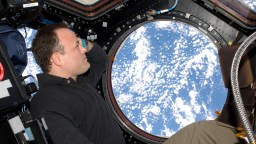Videos
All Stories
Whether we’re conscious of it or not, the things we design can design us as well. “We become what we behold,” as the old proverb goes. Such is the power, explains Jason Silva, of ontological design.
▸
5 min
—
with
Former NASA astronaut Ron Garan recounts how he adopted a new perspective on global solidarity while serving on the International Space Station.
▸
6 min
—
with
Should you invest in Bitcoin? Maybe not, says Brad Templeton, but that doesn’t mean the digital currency isn’t amazing in and of itself. Templeton explains what Bitcoin achieves and how it will lead to further innovation.
▸
4 min
—
with
Chris Anderson, curator of TED Talks, explains how the plummeting price of bandwidth about a decade ago opened opportunities for new innovation to grow.
▸
3 min
—
with
Author Eric Schlosser discusses what he’s learned after writing, publishing, and touring for his book on the illusion of safety associated with nuclear weapons.
▸
3 min
—
with
No one should be plugged in 24/7, says Arianna Huffington. A commitment to mindfulness as a life strategy requires an easing away from our devices, especially before bedtime.
▸
6 min
—
with
The CEO of Crowdfunder discusses disruption of the early stage finance process by way of exponential technology while also explaining the benefits of helping young entrepreneurs compete at scale.
▸
7 min
—
with
In this video, economist and author Tim Harford teaches an important lesson about succeeding at failure through the story of psychologist Leon Festinger’s infiltration of a cult led by Dorothy […]
▸
7 min
—
with
Is there a way to bring out the genius within all of us? The New York Times columnist Carl Zimmer asks neuroscientist Joy Hirsch about the nature of neuro-identity.
▸
8 min
—
with
Neuroscientist Joy Hirsch chats with The New York Times columnist Carl Zimmer about searching within the brain for where “genius” resides.
▸
6 min
—
with
As part of Big Think’s partnership with 92Y’s Seven Days of Genius series, New York Times columnist Carl Zimmer asks Heather Berlin about the research that illuminates our understanding of genius.
▸
7 min
—
with
Neuroscientist Heather Berlin explains current research into creative “flow states,” examining what happens in the brain when rappers and jazz musicians improvise.
▸
7 min
—
with
On Friday 27 February, Big Think partner PwC hosted its second global webcast focused on the question, ‘What would you do if you were not afraid?’ The webcast was part of ‘Aspire to Lead: The PwC Women’s Leadership Series’.
▸
58 min
—
with
Uber is an example of an exponential company that harness technology to revolutionize whole industries.
▸
3 min
—
with
Everyone’s favorite Science Guy chats with Vsauce3’s Jake Roper about the importance of science education in ensuring future generations remain creative, experimental, and evolutionarily competitive.
▸
5 min
—
with
Arianna Huffington explains to Maria Konnikova how mindfulness seeks to recreate “the Garden of Eden, but with consciousness.”
▸
3 min
—
with
Arianna Huffington argues that mindfulness meditation is a necessary antidote to America’s unhealthy work culture.
▸
5 min
—
with
PwC Talent Manager Michael Fenlon discusses the aims of HeForShe, the solidarity movement for gender equality famously championed by actress Emma Watson in a September speech at the United Nations.
▸
2 min
—
with
Centuries-old mindfulness breathing and meditation practices have become an increasingly popular fad, but do they really have the power to transform lives? A growing body of scientific evidence says they do.
▸
7 min
—
with
We now know that flow works not like an on-off switch but in a four-part cycle. Understanding these cycles can help you to more often access flow.
▸
4 min
—
with
There are seventeen triggers for flow that can each draw your attention to the now. Mastering flow means building these triggers into your life.
▸
5 min
—
with
Beyond neuroanatomy and neurochemistry, flow states rely on shifts in the brain’s neuroelectricity.
▸
1 min
—
with
Steven Kotler explains the neurochemical changes during flow states that strengthen motivation, creativity and learning.
▸
4 min
—
with
Flow is technically defined as an optimal state of consciousness where we feel our best and we perform our best. Steven Kotler runs through the neuroanatomic shifts that make it possible.
▸
5 min
—
with
Author Claire Shipman explains the positive aspects of allowing confidence to grow within yourself. The best way to do this is to erase any fears that keep you from leaping toward professional and personal challenges.
▸
3 min
—
with
Former Onyx CEO Tony Coles says that this philosophy of leadership “has influenced almost everything” he has done for the past decade. In this video, learn some of the key tenets of the servant leadership philosophy and how Coles applied it in his own work and career.
▸
3 min
—
with
Ideas are the wrong unit of measurement for innovation, says author Michael Schrage. Instead he recommends reframing good ideas as testable hypotheses that can be run in a fast, simple, cheap business experiment.
▸
3 min
—
with
Former NBA player Shane Battier demonstrates the positive effects data and statistics can have on securing a competitive advantage.
▸
4 min
—
with
Jason Silva, host of National Geographic Channel’s “Brain Games,” speaks to the power of suggestibility with regard to psychedelic experiences.
▸
4 min
—
with
The former chair of the New Zealand SEC discusses the correlation between profitability and having an equal number of men and women on corporate boards.
▸
3 min
—
with





























